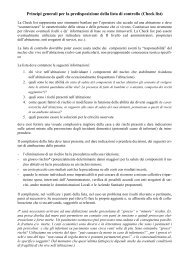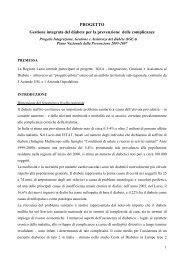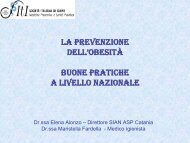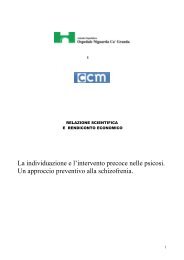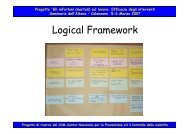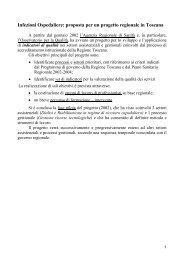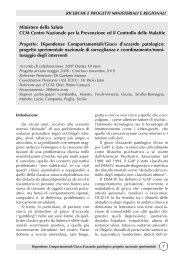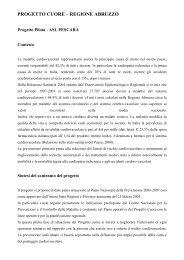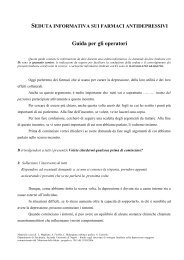Gaining health : analysis of policy development in European ...
Gaining health : analysis of policy development in European ...
Gaining health : analysis of policy development in European ...
You also want an ePaper? Increase the reach of your titles
YUMPU automatically turns print PDFs into web optimized ePapers that Google loves.
Chapter 4<br />
44<br />
• the pr<strong>in</strong>ciple <strong>of</strong> universality<br />
• a strong public sector<br />
• tax fund<strong>in</strong>g<br />
• citizens’ rights grounded <strong>in</strong> legislation<br />
• equal treatment<br />
• social benefits <strong>of</strong> a relatively high level.<br />
With regard to <strong>in</strong>come and wealth distribution, F<strong>in</strong>land is<br />
one <strong>of</strong> the most egalitarian societies <strong>in</strong> the world. Even dur<strong>in</strong>g<br />
the severe economic crisis <strong>of</strong> the early 1990s, strenuous<br />
efforts were made for the survival <strong>of</strong> the Nordic welfare<br />
state, although the level <strong>of</strong> benefits was less generous than<br />
<strong>in</strong> the past and the universalistic nature was weakened.<br />
On the whole, however, masses <strong>of</strong> people were prevented<br />
from slid<strong>in</strong>g <strong>in</strong>to material poverty and multiple deprivation<br />
and <strong>in</strong>come differentials were kept largely under control.<br />
F<strong>in</strong>land has an excellent <strong>in</strong>formation base and strong<br />
research resources that facilitate the reflection <strong>of</strong> possible<br />
<strong>in</strong>equalities <strong>in</strong> <strong>health</strong>. The availability <strong>of</strong> epidemiological data<br />
has made it clear that, despite persistent efforts, <strong>health</strong><br />
gaps between certa<strong>in</strong> socioeconomic groups cont<strong>in</strong>ue to<br />
grow. This has been partly exacerbated by growth <strong>in</strong> the<br />
share <strong>of</strong> the highest <strong>in</strong>come decile and persistent long-term<br />
unemployment. The Health 2015 public <strong>health</strong> programme<br />
therefore states that “another aim will be to reduce <strong>in</strong>equality<br />
and <strong>in</strong>crease the welfare and relative status <strong>of</strong> those<br />
population groups <strong>in</strong> the weakest position. The objective<br />
will then be to reduce mortality differences between the<br />
genders, groups with different educational backgrounds,<br />
and different vocational group<strong>in</strong>gs by a fifth” (14).<br />
All the F<strong>in</strong>nish <strong>policy</strong> documents exam<strong>in</strong>ed for this study refer<br />
to the Nordic welfare state and the reduction <strong>of</strong> <strong>health</strong><br />
<strong>in</strong>equalities as be<strong>in</strong>g central goals <strong>of</strong> F<strong>in</strong>nish <strong>policy</strong>. A 2004<br />
report by MSAH exam<strong>in</strong>ed how <strong>in</strong>equalities <strong>in</strong> <strong>health</strong> are<br />
tackled <strong>in</strong> England, the Netherlands and Sweden <strong>in</strong> order<br />
to “<strong>in</strong>troduce experiences ga<strong>in</strong>ed <strong>in</strong> these countries to the<br />
F<strong>in</strong>nish audience, and to assess whether lessons could be<br />
learnt” (20).<br />
Adherence to the pr<strong>in</strong>ciples <strong>of</strong> the Nordic welfare state<br />
provides a clear general framework for <strong>policy</strong> <strong>development</strong><br />
at a national level <strong>in</strong> F<strong>in</strong>land, a situation not so easily evident<br />
<strong>in</strong> other countries. Nevertheless, although the equality pr<strong>in</strong>ciples<br />
have been so clearly stated and over a long period<br />
<strong>of</strong> time, it is more difficult to discern the <strong>policy</strong> <strong>in</strong>terventions<br />
<strong>in</strong>tended to narrow the gaps, particularly <strong>in</strong> relation<br />
to NCD. There is also some concern that <strong>in</strong> recent years<br />
the Nordic model has become rather shaky and that lower<br />
standards are be<strong>in</strong>g tolerated.<br />
2.1.4. Sett<strong>in</strong>g the agenda<br />
The long history <strong>of</strong> develop<strong>in</strong>g Health for All policies <strong>in</strong> F<strong>in</strong>land<br />
created a particular way <strong>of</strong> th<strong>in</strong>k<strong>in</strong>g, as did the North<br />
Karelia Project that ga<strong>in</strong>ed worldwide fame. The young, talented<br />
leaders <strong>of</strong> those movements orig<strong>in</strong>ally set the agenda.<br />
S<strong>in</strong>ce key bureaucrats do not change with chang<strong>in</strong>g governments,<br />
they have been <strong>in</strong> place for three decades and are<br />
now approach<strong>in</strong>g or have just reached retirement age. It<br />
is not clear who their “heirs” might be. However, although<br />
the personal leadership qualities <strong>of</strong> such key actors might<br />
not necessarily have been replicated, it is probable that the<br />
system prevalent <strong>in</strong> F<strong>in</strong>land <strong>of</strong> facilitat<strong>in</strong>g on-the-job tra<strong>in</strong><strong>in</strong>g<br />
and <strong>of</strong> mov<strong>in</strong>g staff between research, the academic field<br />
and the bureaucracy will ensure that experienced people<br />
emerge from among the cohorts <strong>of</strong> younger experts.<br />
The small population <strong>of</strong> the country and easy personal<br />
contact strengthen a system that allows for open discussion<br />
<strong>of</strong> the challenges and an approach <strong>of</strong> “cont<strong>in</strong>uation plus<br />
change” to deal with them.<br />
Another important condition for agenda sett<strong>in</strong>g was F<strong>in</strong>land’s<br />
accession to the EU. F<strong>in</strong>land was acutely conscious <strong>of</strong><br />
the possible challenges and opportunities for <strong>health</strong> <strong>in</strong> jo<strong>in</strong>-<br />
Case studies: <strong>policy</strong> <strong>development</strong> <strong>in</strong> countries for tackl<strong>in</strong>g noncommunicable diseases



